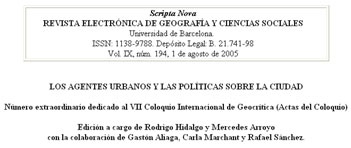Social management of government policy in small cities
Keywords:
government policy, small cities, social managementAbstract
This paper seeks to analyse the development of experiences of social management of government policy in small cities, in the light of a new institutional context which came about with the Brazilian Constitution of 1988. This introduced new possibilities for arrangements of social management of government policy, in particular the institutionalization of popular municipal councils. This constitution also enlarged the political and administrative autonomy of municipalities and thus fostered the emergence of a space for policy making, management, control and evaluation, a crucial aspect of the enhancement of democratic procedures in the country. Notwithstanding, considering socio-spatial aspects in small cities, it is here emphasized in the discussion the ways in which the new popular municipal councils constitute spaces of struggle in the arena of institutional restructuring. In this way, it is important to further the understanding of the balance of power and representation in these local councils. This paper understands social management as a complex set of actions which includes the articulation and formation of councils, the setting of conditions under which participation in the councils takes place, relations of power and legitimacy, the diversity of actors involved in the process as well as the ways that local authorities relate to the councils. As empirical evidence, we have chosen the small cities in the state of Rio Grande do Norte, Brazil. We used IBGE data bases. Conclusions point to the fragile situation of councils in respect to its formation, functioning and legitimacy. This is explained in the light of the predominance of old forms of political domination still prevalent in the region.Downloads
Published
2007-06-07
Issue
Section
Articles
License
Los autores que publican en esta revista están de acuerdo con los siguientes términos:
- Los autores conservan los derechos de autoría y otorgan a la revista el derecho de primera publicación, cin la obra disponible simultáneamente bajo una Licéncia de Atribución Compartir igual de Creative Commons que permite compartir la obra con terceros, siempre que estos reconozcan la autoría y la publicación inicial en esta revista.
- Los autores son libres de realizar acuerdos contractuales adicionales independientes para la distribución no exclusiva de la versió de la obra publicada en la revista (com por ejemplo la publicación en un repositorio institucional o en un libro), siempre que se reconozca la publicación inicial en esta revista.





